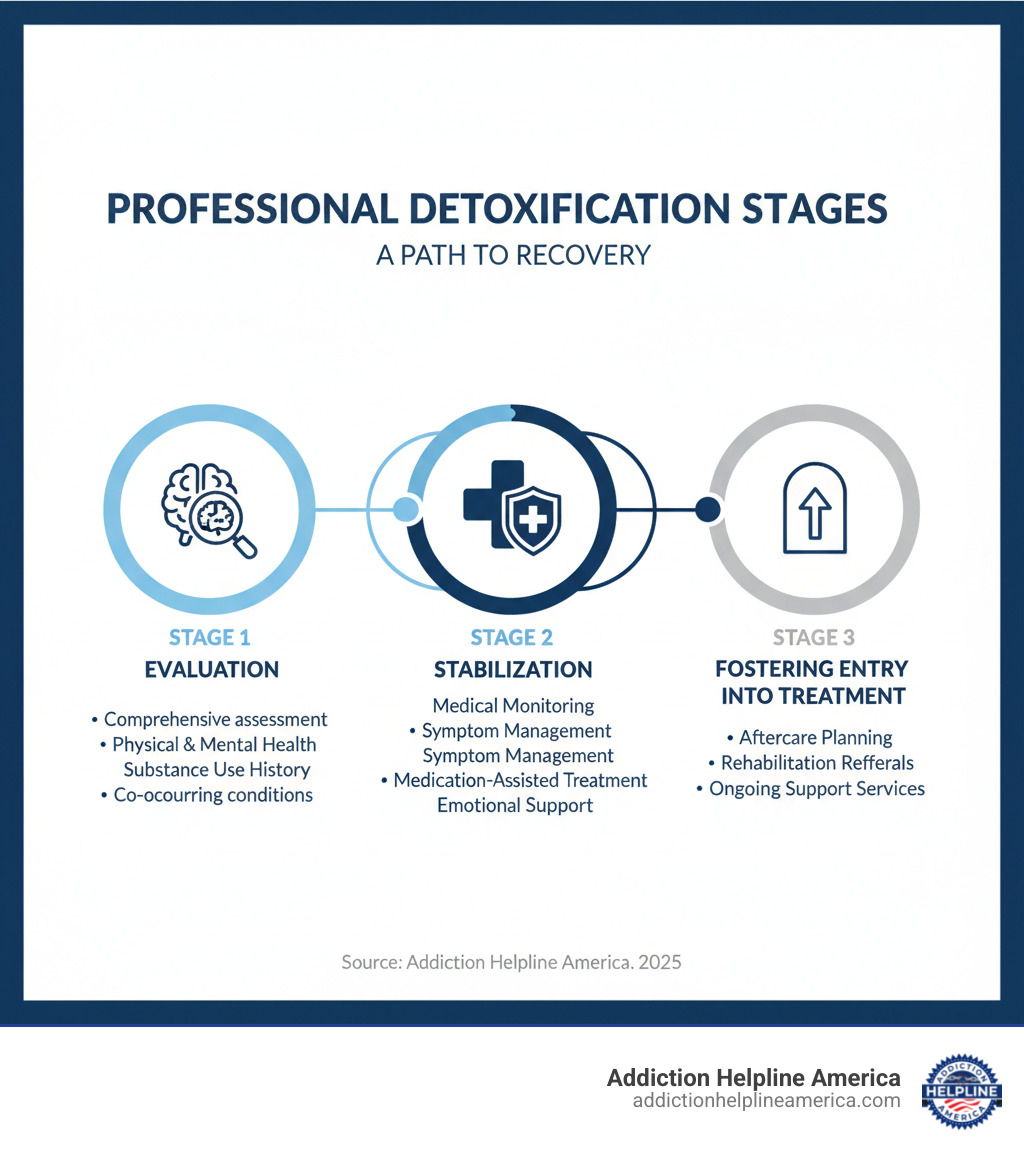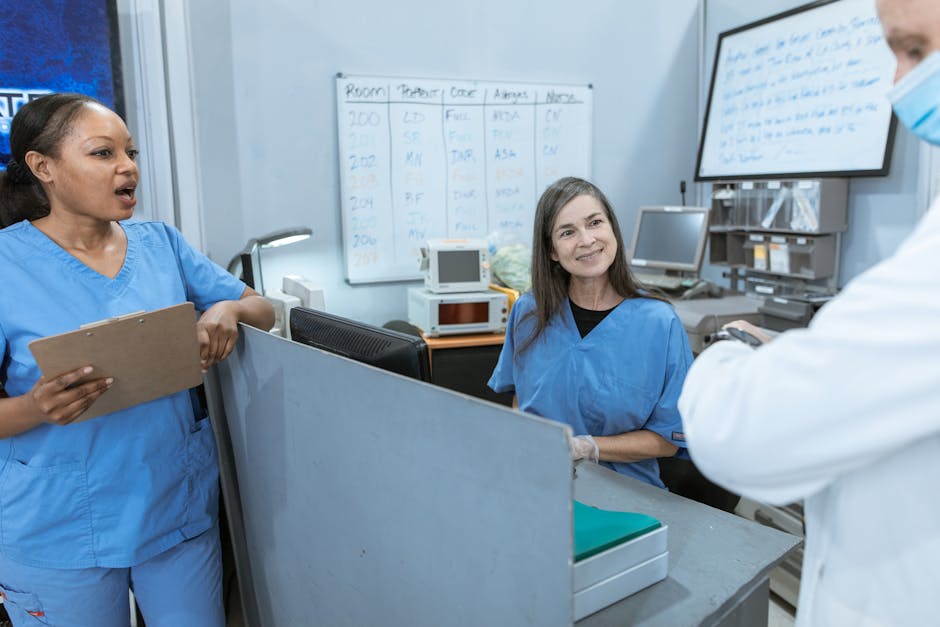
Why Finding the Right Detox Facility Near You Matters
Searching for “detox facilities near me” is the first critical step toward recovery. These centers provide medically supervised withdrawal management to help people safely stop using drugs or alcohol. With 24/7 medical monitoring and professional support, they manage withdrawal symptoms that can range from uncomfortable to life-threatening.
Quitting substances like alcohol or benzodiazepines “cold turkey” can be dangerous, potentially causing seizures or death. Professional detox centers provide a controlled environment to manage these risks safely. The process involves three key stages:
- Evaluation: Assessing your physical and psychological condition.
- Stabilization: Providing medical care and medication to manage withdrawal.
- Fostering Readiness: Preparing you to enter long-term addiction treatment.
Detox is the beginning of the recovery journey, not the end. It stabilizes you physically so you can engage in the deeper work of rehabilitation. Programs can last from a few days to several months, with emergency options available for those in immediate crisis.
At Addiction Helpline America, we’ve helped thousands find appropriate detox facilities and other addiction treatment services. Our team offers 24/7 confidential support to connect you with the right resources. This guide will help you understand what detox facilities offer, how to compare them, and what to expect, so you can take this crucial first step with confidence.

Understanding Detox: The First Step to Recovery
Detoxification—the process of clearing substances from your system—is often the most physically challenging part of early recovery. When you stop using, your body must relearn how to function without the substance, causing withdrawal symptoms. This is why searching for “detox facilities near me” is so important; professional medical supervision isn’t just about comfort, it’s about safety.

Withdrawal symptoms depend on the substance, dosage, and duration of use. Alcohol withdrawal can escalate to seizures or delirium tremens (DTs), a severe condition that can be fatal without medical care. Benzodiazepine withdrawal carries similar risks. Opioid withdrawal, while not typically life-threatening, causes extreme flu-like symptoms, intense pain, and overwhelming anxiety that often lead to relapse.
The Risks of Detoxing at Home
Attempting to detox at home is risky. Medically, alcohol and benzodiazepine withdrawal can cause life-threatening seizures. Psychologically, the intense discomfort and emotional distress make relapse incredibly difficult to resist, especially when surrounded by familiar triggers. In a professional detox center, these risks are managed. Medical staff monitor you 24/7, administer medications to ease symptoms, and provide crucial emotional support.
Specialized Detox Programs for Specific Substances
Different substances require different detox protocols. A quality facility will offer specialized treatment based on your needs.
- Alcohol Detox: Often involves medications to prevent seizures and reduce agitation.
- Opioid Detox: Frequently uses Medication-Assisted Treatment (MAT) with drugs like buprenorphine to reduce cravings and withdrawal symptoms.
- Benzodiazepine Detox: Requires a slow, medically supervised taper to prevent seizures.
- Stimulant Detox: Focuses on managing psychological symptoms like severe depression and cravings with supportive care.
These custom approaches are why professional help is vital. For more information on how different substances are treated, visit our resource on drug detox. The bottom line is that detox is too dangerous to attempt alone. Professional detox facilities near me provide the medical expertise and supportive environment needed for a safe and successful start to recovery.
Call Now – Your Journey to Recovery Begins Today!

Take the first step towards a healthier life! Call now to connect with our compassionate team and start your recovery journey today. Your path to healing awaits!
Our recovery specialists are available 24/7 to provide support, and all calls are confidential and free. Reach out anytime – we’re here to help!
Comparing Detox Program Types and Levels of Care
When you search for detox facilities near me, you’ll find various programs designed for different needs. The two main types are inpatient and outpatient detox.
Inpatient Detox
Inpatient (or residential) detox provides 24/7 care within a facility. This is the safest option for those with severe substance use disorders, a history of dangerous withdrawal symptoms (like seizures), co-occurring health conditions, or an unstable home environment. The structured setting removes you from triggers and ensures immediate medical help is always available.
Outpatient Detox
Outpatient detox allows you to live at home while attending regular appointments at a clinic for medical check-ins and support. This flexible option is suitable for individuals with mild to moderate withdrawal risk, a strong and stable support system at home, and the self-discipline to follow the treatment plan. It allows you to maintain work or family responsibilities during treatment.
Inpatient vs. Outpatient: A Side-by-Side Look
| Feature | Inpatient Detox | Outpatient Detox |
|---|---|---|
| Supervision Level | 24/7 medical monitoring and immediate support | Scheduled appointments with medical oversight |
| Environment | Structured, substance-free residential facility | Home-based with regular clinic visits |
| Ideal Candidate | Severe SUD, high complication risk, unstable home | Mild to moderate SUD, stable home, highly motivated |
| Flexibility | Limited—you live at the facility during treatment | High—you maintain daily responsibilities at home |
| Cost | Generally higher due to residential care | Generally lower with fewer overhead costs |
| Safety | Highest level with constant medical presence | Moderate—depends on self-management between visits |
Program Durations and Emergency Care
The length of detox depends on the substance, usage history, and your health. Programs can be short-term (3-10 days) for initial stabilization or longer-term (30-180 days) for more complex cases. Common durations like 10-day, 21-day, and 30-day programs allow for progressively deeper physical and psychological stabilization before transitioning to the next phase of recovery.
For urgent situations, same-day emergency detox centers provide immediate medical intervention. This is critical for anyone at high risk for life-threatening withdrawal from alcohol or benzodiazepines, or those experiencing an overdose. These centers stabilize the immediate crisis and then help you transition to a full detox and rehabilitation program.
5 Steps to Find and Compare the Best Detox Facilities Near Me
Finding the right detox facility can feel overwhelming, but breaking it down into five steps makes it manageable. At Addiction Helpline America, we guide people through this process daily.
1. Verify Accreditation and Licensing
First, ensure any detox facilities near me you consider are legitimate and safe. Every facility must be licensed by its state’s substance use agency, which confirms it meets basic safety and care standards. You can usually verify this on your state’s Department of Health website.
Beyond that, look for accreditation from national organizations like the Commission on Accreditation of Rehabilitation Facilities (CARF) or The Joint Commission. These accreditations signify a higher commitment to quality and patient care, as they require facilities to meet rigorous, evidence-based standards.
2. Evaluate Services and Treatment Approaches
Next, examine what the facility offers. Quality programs provide 24/7 medical monitoring, which is essential for safely managing withdrawal from substances like alcohol and benzodiazepines. Look for facilities that also integrate individual and group therapy to address the psychological aspects of withdrawal from the start.
Medication-Assisted Treatment (MAT) is a critical service for opioid and alcohol dependence, using FDA-approved medications to ease withdrawal and reduce cravings. If you struggle with a mental health condition like depression or anxiety alongside addiction, find a facility offering dual-diagnosis care to treat both conditions simultaneously. Learn more about MAT and treatment options.
3. Assess Staff Qualifications and Support

The quality of the staff is paramount. A good facility’s team includes medical doctors (ideally addiction specialists), registered nurses for round-the-clock care, and licensed therapists for emotional support. A low staff-to-patient ratio ensures you receive personalized attention. Beyond credentials, seek a team known for its compassion and respect, as this can transform a difficult experience into a healing one.
4. Understand the Costs and Insurance Coverage
Cost should not be a barrier to getting help. Start by calling your insurance provider to understand your benefits for substance abuse treatment, including deductibles and co-pays. Many facilities, including those in our network, can verify your insurance for you.
If you have Medicaid or Medicare, you may have significant or full coverage. For those without insurance, many centers offer private pay options, payment plans, or sliding-scale fees based on income. State-funded programs also provide free or low-cost treatment for eligible residents.
5. Plan for the Next Steps After Detox
Detox is the first step, not a cure. Lasting recovery requires ongoing treatment. A quality detox center will help you create a clear aftercare plan before you leave.
This plan often involves a seamless transition to the next level of care, such as residential rehabilitation, an Intensive Outpatient Program (IOP), or a Partial Hospitalization Program (PHP). Sober living environments and ongoing participation in support groups like AA or NA are also vital components of long-term recovery. The best facilities see themselves as the start of your journey and ensure you have a roadmap for what comes next.
Call Now – Your Journey to Recovery Begins Today!

Take the first step towards a healthier life! Call now to connect with our compassionate team and start your recovery journey today. Your path to healing awaits!
Our recovery specialists are available 24/7 to provide support, and all calls are confidential and free. Reach out anytime – we’re here to help!
What to Expect: The Admission and Detox Process
Knowing what happens at a detox facility can ease anxiety about taking the first step. While protocols vary, the process is designed for your safety and comfort.

The Admission Process
Your journey usually starts with a confidential phone call to a facility or a helpline like ours. A specialist will ask about your substance use, medical history, and current health to determine the right level of care. This is a judgment-free conversation focused on your safety.
Upon arrival, you’ll undergo a thorough intake assessment. This includes:
- Physical Assessment: A medical exam to check vital signs and overall health.
- Psychological Assessment: A conversation with a mental health professional to screen for co-occurring conditions like depression or anxiety.
- Substance Use History: A detailed discussion about what, how much, and how long you’ve been using.
This information helps the team create your personalized care plan. You’ll also complete paperwork and your belongings will be checked to ensure a safe, substance-free environment.
What to Pack
Pack lightly. Most detox facilities near me recommend:
- A few changes of comfortable, loose-fitting clothes.
- Basic toiletries (toothbrush, deodorant, etc.).
- Prescribed medications in their original, labeled bottles.
Leave electronics, weapons, outside substances, and strongly scented products at home. If you’re unsure, ask the facility for a list.
The Stabilization Process: Your Body Begins to Heal
Once admitted, stabilization begins. The medical team works to safely manage your withdrawal symptoms. This involves 24/7 medical monitoring of your vital signs and symptoms. Medication management is key; you may receive medications to ease discomfort, prevent complications like seizures, and reduce cravings.
Beyond medical care, you’ll receive supportive care, including nutritious meals and a calm environment for rest. Emotional and psychological support from counselors is just as important. You’ll learn initial coping strategies and may participate in early group therapy sessions to connect with others in a similar situation. The goal is to get you through acute withdrawal safely and prepare you for the next phase of recovery.
Immediate Help and Resources
When you’re ready to take the first step, you don’t have to do it alone. Several national resources offer free, confidential support 24/7 to connect you with detox facilities near me and other treatment options.
SAMHSA National Helpline: Call 1-800-662-HELP (4357) for free, 24/7 treatment referrals and information. Trained specialists can help you locate detox and rehab programs in your area.
988 Suicide & Crisis Lifeline: If you are in emotional distress or considering suicide, call or text 988. You’ll be connected with a compassionate counselor for immediate crisis support.
Disaster Distress Helpline: For crisis counseling related to natural or human-caused disasters, call 1-800-985-5990.
FindTreatment.gov: This confidential online tool, authorized by SAMHSA, allows you to search for treatment facilities by location, services, and payment options. You can use it to find providers for detox, mental health, and substance use treatment across the United States. Visit FindTreatment.gov to start your search.
At Addiction Helpline America, we also provide free, confidential guidance to help you find the right treatment. We can help you understand your options and connect you with a quality program. For more information, see our Detox Drug Treatment Guide Near Me. Reaching out is a sign of strength, and these resources are here to help.
Call Now – Your Journey to Recovery Begins Today!

Take the first step towards a healthier life! Call now to connect with our compassionate team and start your recovery journey today. Your path to healing awaits!
Our recovery specialists are available 24/7 to provide support, and all calls are confidential and free. Reach out anytime – we’re here to help!
Frequently Asked Questions about Detox Facilities
It’s normal to have questions and fears about detox. Here are answers to some common concerns to help you feel more prepared.
How long does detox usually take?
The average detox for acute withdrawal lasts 3 to 10 days, but the exact timeline is personalized. The length depends on several factors, including the type of substance used, your usage history, and your overall physical and mental health. For example, alcohol or benzodiazepine withdrawal may require a longer, more gradual process for safety. The medical team at the facility will determine the appropriate length of stay to ensure you are physically stable and ready for the next step in your recovery.
Is the detox process painful?
Withdrawal can be uncomfortable, but professional detox facilities near me exist specifically to manage your symptoms and keep you as comfortable and safe as possible. You will be under 24/7 medical supervision, and the healthcare team will use medications to significantly ease withdrawal symptoms. For opioid withdrawal, Medication-Assisted Treatment (MAT) can drastically reduce cravings and painful flu-like symptoms. For alcohol withdrawal, medications can prevent dangerous complications like seizures. The goal is to make the process tolerable so you can focus on healing, not just enduring pain.
What happens after I finish a program at one of the detox facilities near me?
Completing detox is a major achievement, but it is the first step in recovery, not a cure. Detox addresses the physical dependence on a substance, but addiction also has deep psychological and behavioral roots. Lasting sobriety requires addressing these underlying issues.
After detox, most people transition to a continuing level of care. A good facility will help you create an aftercare plan. Common next steps include:
- Inpatient Rehabilitation: Living at a facility for 30-90 days for intensive therapy.
- Outpatient Programs (PHP/IOP): Attending structured treatment several days a week while living at home.
- Sober Living Environments: Living in a supportive, substance-free home with peers in recovery.
- Continued Therapy and Support Groups: Engaging in ongoing counseling and groups like AA or NA to maintain sobriety.
Conclusion
You’ve taken a courageous first step by learning about detox facilities near me. Understanding why professional detox is a critical and necessary part of recovery is key to making a lasting change for yourself or a loved one.
As this guide has shown, the right facility provides a safe, medically supervised environment to manage withdrawal. It offers evidence-based care, employs a compassionate staff, and, most importantly, helps you plan for the next steps after detox is complete. This continuity of care is what transforms a difficult first step into a successful recovery journey.
Recovery is possible, and it starts with reaching out for help. At Addiction Helpline America, we provide free, confidential, and personalized guidance to connect you with the right program from our nationwide network of treatment centers. We are here 24/7 to listen without judgment and help you find your path forward.
Whether you’re in Louisiana, Colorado, or anywhere else in the U.S., quality care is within reach. Find the right alcohol and drug addiction treatment in New Orleans for you or a loved one, or call us to explore options in your area. Your journey can begin today.
Our helpline is 100%
free & confidential
If you or someone you care about is struggling with drug or alcohol addiction, we can help you explore your recovery options. Don’t face this challenge alone—seek support from us.
Programs
Resources
Will my insurance
cover addiction
treatment?
We're ready to help
Find the best
drug or alcohol treatment
center
Are you or a loved one struggling with addiction? Call today to speak to a treatment expert.















